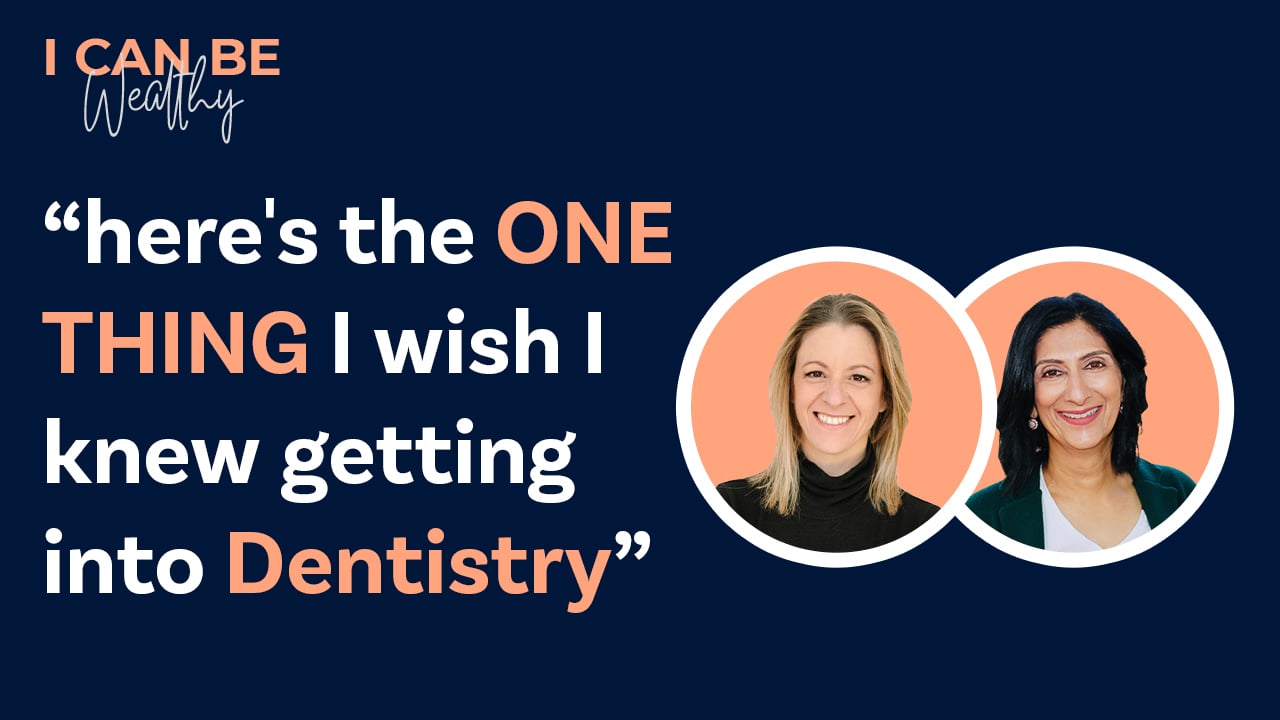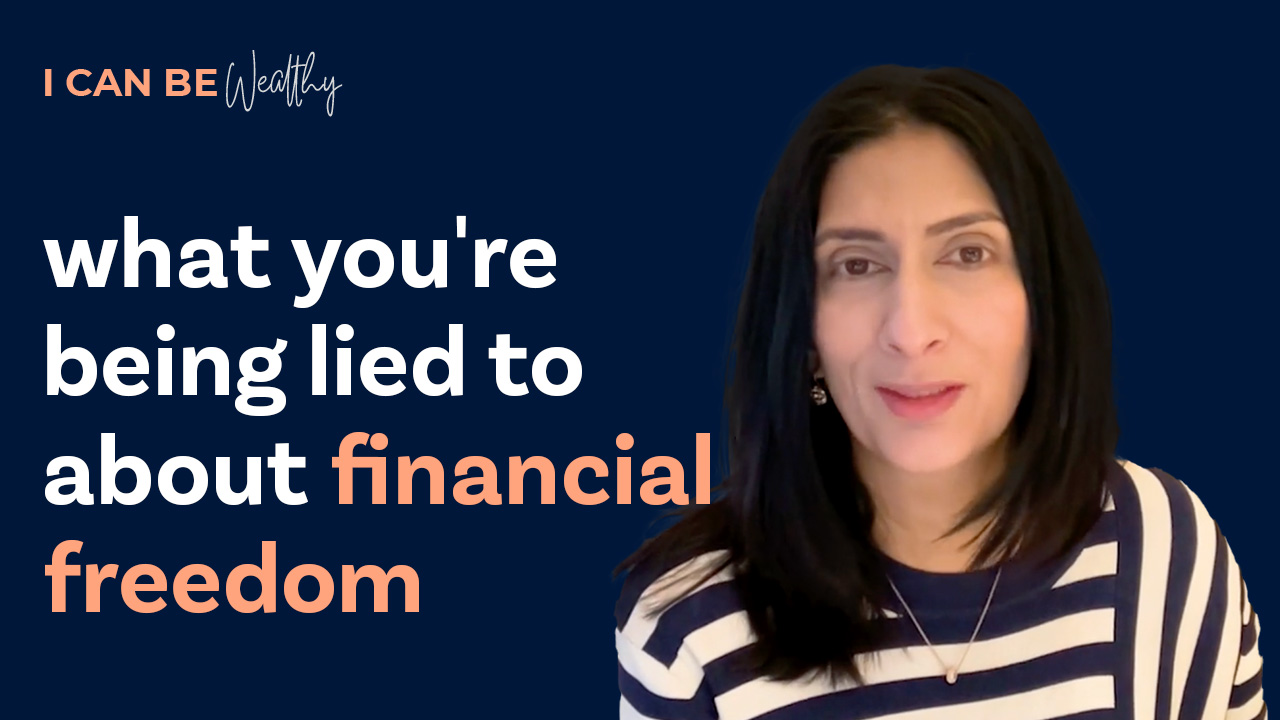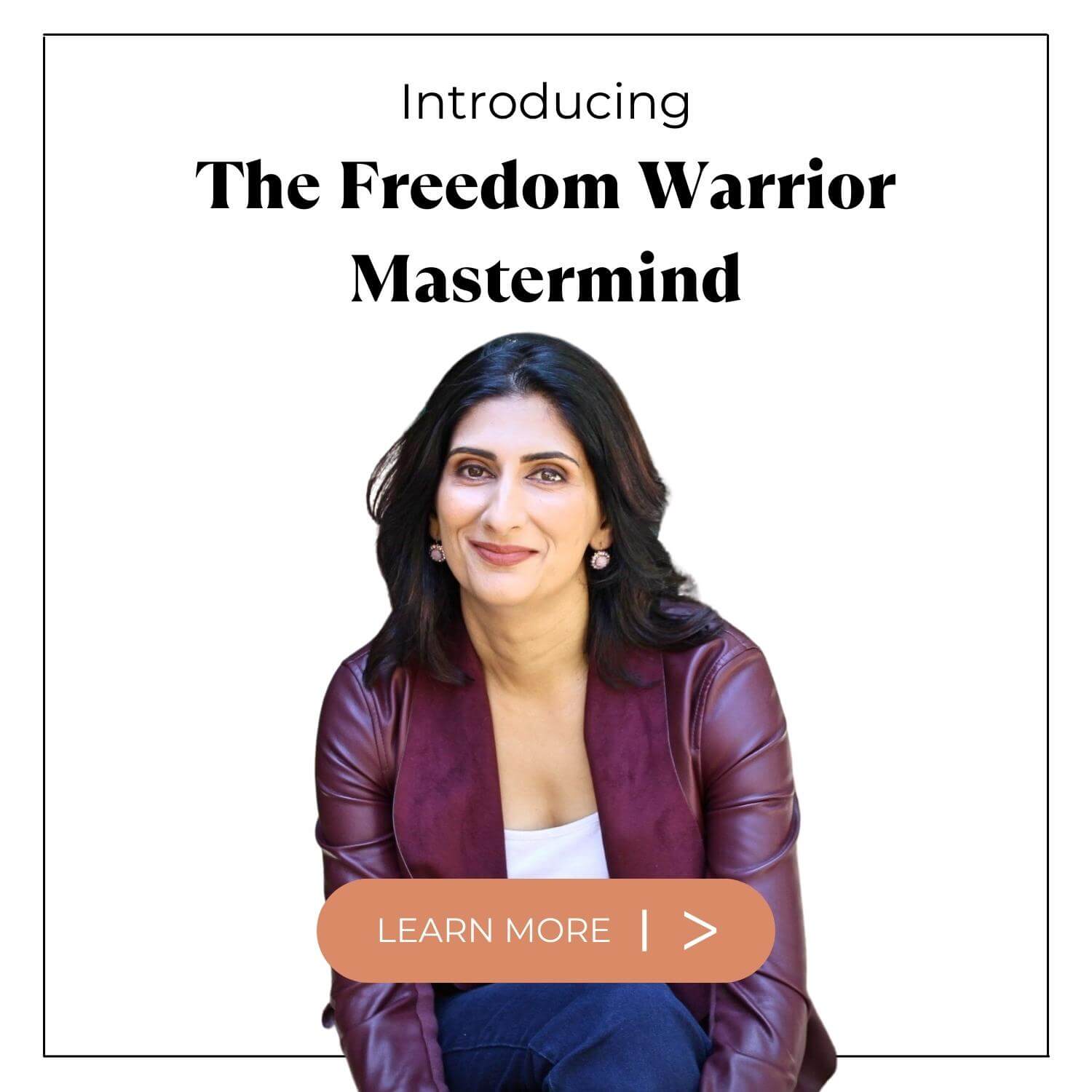On High Performance, Wealth Building and Investing with John Peitzman on The BUILD Show
Connect:
Website: https://www.inkosiwealth.com/
Facebook: https://www.facebook.com/iamSalenaKulkarni
LinkedIn: https://www.linkedin.com/in/propertystrategist/
YouTube: https://www.youtube.com/c/FreedomWarrior
00:00 – Introduction to the Show
01:07 – What I’m Excited About Right Now
02:21 – How my Upbringing shaped my Perspective on Wealth
04:25 – Building Powerful Relationships
09:36 – My Strategies for Wealth Building
Read More13:30 – Importance of Mentorship and Guidance
18:12 – The Secret to Delivering Excellence
19:08 – Finding Balance at Home and at Work
20:56 – “Success is a Process of Shedding”
21:32 – Not Succumbing to F.O.M.O when Investing
Salena Kulkarni:
Hi everyone. Salena Kulkarni here. And welcome to another episode of The Freedom Warrior Podcast, where it is my job to share with you the latest tactics, strategies and insights on how you can go about creating rapid financial freedom, particularly through alternative property investing strategies.
Salena Kulkarni:
Today, I am super excited to be sharing with you an interview that I gave a few weeks away with a dear friend of mine, John Peitzman. He is a legend in the high performance space. And what I love about this particular interview that I gave was how great he was at asking a very diverse, but very insightful set of questions.
Salena Kulkarni:
Some of the things that I share in this particular episode will really kind of open your mind to a little bit around how philosophically I think, and how you can go about creating financial freedom in a much more effective way than the average Joe investor. So I hope you enjoy it and look forward to seeing you on the other side. Now, on with the show.
Read MoreJohn Peitzman:
Welcome to The BUILD Show.
Salena Kulkarni:
Terrific to be here. Thanks for having me.
John Peitzman:
Great. I’m so excited to have this conversation. Tell me, I guess, as we start, what are you excited about as we sit here today?
Salena Kulkarni:
What am I excited about? I think in my own world right now, there’s definitely a sense of great flow, as a, I say, reformed chartered accountants sometimes. That was a space that didn’t really give you much creativity and didn’t really encourage passion. So I feel that definitely, the pathway that I’m on right now feels very much in flow. Sometimes accountants feel like they don’t make a huge difference. I feel that what I’m doing now, it’s not impacting a huge number of people, but it’s making a difference in the lives of the people that I work with. So I’m super excited about that.
John Peitzman:
Right. And how long has The Freedom Warrior Mastermind been going on?
Salena Kulkarni:
Look, Freedom Warrior in itself has only been around a couple of years, but the evolution of the ideas has really been my life’s work. It’s something that-
John Peitzman:
It’s funny how that works, where a lot of times we have this vision and this dream that we actually work on our entire lives, but then it actually comes to fruition-
Salena Kulkarni:
Totally.
John Peitzman:
… in the business sense years later.
Salena Kulkarni:
Absolutely. So I think my fascination with the world of money and wealth started as a much younger child, but for not the reasons that maybe people would normally assume. It was never for the power or having fancy cars or fancy homes. It was never about that kind of stuff. It was more the play of money and how I saw it shape people’s worlds and how it shaped who people were in the world.
John Peitzman:
So you were that kid who would set the lemonade stand and were starting to-
Salena Kulkarni:
No. Actually, no.
John Peitzman:
… get revenue in business at like five and six years old or no, that’s not you?
Salena Kulkarni:
No, definitely not. I mean, I definitely had fantasies of being like the Richard Branson of something at some point, but no. My real driver was actually my dad. When we migrated from the UK to Australia, he was diagnosed with a fairly serious condition and told he had six months.
John Peitzman:
Right.
Salena Kulkarni:
What I saw in him was it was almost like someone switched the flick, flicked the switch, I should say. He kind of transformed overnight. He became so stressed about how his wife and two kids were going to survive. We came to Australia at that time. There was no kind of beacon of light or hope. But during that six month block, he got an opportunity to participate in some experimental type stuff and got told we might have another six months and then it became another six months.
John Peitzman:
Right. Amazing.
Salena Kulkarni:
But you know how that shaped him really influenced me. I kind of saw that there was constant worry around money. I think as a teenager, it might’ve even been subconscious, but I just decided I don’t ever want to have that relationship with money. I don’t want to be stressed about having enough. Luckily though, I’ll finish the story, my father actually went on and survived another 30 years.
John Peitzman:
Wow. Amazing.
Salena Kulkarni:
But I just can’t imagine what it would have been like to sort of think you only have another six months for a full 30 years.
John Peitzman:
Right. Amazing.
Salena Kulkarni:
Yeah. Amazing.
John Peitzman:
And we’ll talk about that, in relation to this probably. So I mean, a lot of goals we’re going to talk about, I can tell this is going to be a fantastic conversation. And as you know, we frame the conversation around BUILD. For those of you who still don’t know what the BUILD framework is, go to the buildframework.com. I’ll give you the cheat sheet right now, which is the acronym. BUILD stands for build relationships, understand the business, implement strategies, lead and inspire and deliver excellence.
John Peitzman:
And as always what we do on this show, which is so wonderfully unique, because everyone has a different story with that whole pattern and journey on their life. And we talk about those areas as it relates to your journey. And you kind of already started to talk about the relationship piece, I bet, but let’s start officially into BUILD and talk about the relationship, building relationships in some of the most kind of powerful relationships that you’ve had on your journey.
Salena Kulkarni:
Such a great question. And I love that component being upfront. I think unfortunately in Australia, we are in a lot of ways led to believe that it’s a DIY thing when it comes to building wealth and money. I think the single biggest influence on my own success was when I started to cultivate relationships with people who could really remove friction, give me wisdom that I wasn’t going to get out of a book and really change my insights.
Salena Kulkarni:
I’ve met plenty of those sorts of people on my journey, but I think interestingly, I mean, my husband has been instrumental in my world. He’s, a very excitable soul. He’s very grounded and calm. But I met a guy when I did… I did some yoga teacher training about 20 years ago.
John Peitzman:
Oh, great.
Salena Kulkarni:
Just randomly. But he was probably very influential in terms of the journey towards simplicity, the pursuit of wisdom. He really kind of lit a fire in me in terms of understanding the why and the how of things work. And so I think people can tend to be, especially around the topic of wealth, very mechanical. And there’s a lot of formal education out there around money and wealth, but yeah, he kind of taught me to really understand more the how it moves, energetically, how it influences.
John Peitzman:
Yeah. It’s an energy, absolutely.
Salena Kulkarni:
Yeah. So I think that was a real shift for me. So definitely [crosstalk 00:06:44]-
John Peitzman:
Are you still in touch with him?
Salena Kulkarni:
Oh, absolutely.
John Peitzman:
Oh, yeah. Okay. [crosstalk 00:06:46]-
Salena Kulkarni:
So I named my youngest child after him. Yeah.
John Peitzman:
That’s in touch.
Salena Kulkarni:
Yeah, totally.
John Peitzman:
Okay.
Salena Kulkarni:
But yeah, someone who just makes sense of life and money is one element of life.
John Peitzman:
Right.
Salena Kulkarni:
Yeah.
John Peitzman:
Well, it’s interesting too, because in the BUILD framework, we talk about centrifugal looping, which is the foundational element being build relationships. And then it’s based upon those relationships that you then move to the next thing you, which is understand the business, and you already kind of articulated that, which is you build that relationship and then he helped you to understand the business, right, a lot better. Are there other kind of pearls of wisdom from the standpoint of understanding the business that you’d like to share with our listeners?
Salena Kulkarni:
Oh, wow. Well look, I think when it comes to the business of wealth creation and seriously, if you’re an entrepreneur, you will probably relate more to the business of wealth creation. I think one of the most important things that has really shaped my world is that it’s the right education at the right time, the right wisdom at the right time. So I think people tend to think that there’s just this bucket of knowledge out there and you just have to consume it all, and then you’ll understand the mechanics of how things work.
John Peitzman:
Only if it was that easy, right?
Salena Kulkarni:
I know. I know. I’ve become such a fan of this idea that it’s about consuming the right knowledge at the right time. In the business of money and wealth, I definitely feel one of the frameworks I talk about is there’s seasons.
Salena Kulkarni:
So when you start out as an investor, you’re in spring. And the focus is on how do I create surplus. And if you don’t have the fundamentals right about that, you’re never going to make it to the other seasons. So spring is about how do I create surplus so I can even begin the idea of investing. And then you move into summer and summer’s all about getting the wisdom that you need to get traction. So how do you use leverage? How do you access the right investments, all that stuff. The wall, unfortunately for most investors sits at end of summer. So you kind of invest for a while and you think, “Well, I just got to wait and see what happens now.”
Salena Kulkarni:
But for those people who ask the question of what else, you can move up into autumn, and autumn’s all about optimizing. This is where the play of money becomes so much more interesting. Then beyond autumn is winter. And winter is where the ultra wealthy play. And the ultra wealthy are into preservation. So again, there’s a different set of wisdom and knowledge that you need at that point in your journey as well.
John Peitzman:
I love that analogy. I love the visuals and just the [crosstalk 00:09:24]-
Salena Kulkarni:
Yeah. Well, it was a simple, simple metaphor, but yeah.
John Peitzman:
Yeah. And weather and seasons, and it’s so true. That leads to like implementing strategies. Right? That’s a great strategy. What other topics come to mind or insights come to mind when we talk about implementing strategies and your journey?
Salena Kulkarni:
Yeah. Look, I think the cornerstone of being a successful investor and creating wealth that will endure… Like, I love the topic of intergenerational wealth. It’s one that people give a lot of lip service to, and they don’t… Like people talk about it from the framework of you need these legal structures and you need to do tax in this way. But intergenerational wealth is a topic that I think is super fascinating.
Salena Kulkarni:
The statistics around how many people actually create that is just phenomenal. I think of-
John Peitzman:
Low or high?
Salena Kulkarni:
Of all the people who could create intergenerational wealth, and you can read lots of different studies, I think about 5% actually succeed. So it’s really low in terms of… I think the story that I tell is you will make the money, your kids will blow it, and their kids will start over again.
John Peitzman:
Right.
Salena Kulkarni:
That’s the average. That’s what the average looks like.
John Peitzman:
So even if it does pass on from a generation, because some don’t even do that much. Right? They just don’t even have anything to pass on, but when they do, the pattern is then the next generation blows it and then [crosstalk 00:10:51]-
Salena Kulkarni:
Exactly. So I think one of the cornerstones for me of talking about strategy is the concept… the lost art of stewardship. It’s not a word that’s used very heavily in Australia, but if you can’t be a great steward of your money, if you can’t care for, look after, amplify, the money that you earn, it’s very, very hard to ever be financially free.
Salena Kulkarni:
And so for me, the strategy that has had the single biggest impact in my world has been the fact that early on, I learned great stewardship. It’s about having a really healthy relationship with money, about recognizing when there’s maybe something there that’s causing friction. But yes, stewardship as a strategy is about understanding how to kind of channel money into different things in a way that is completely effortless. There’s some great things, like there’s great tools to automate, a lot of that sort of stuff.
Salena Kulkarni:
But I never actually earned a great income from anything I did. Like even when I was at the height of my accounting career, I think I was maybe on about $80,000. So it wasn’t anything to write home about, but I was exceptional at taking $1 and amplifying it.
John Peitzman:
Right.
Salena Kulkarni:
Yeah.
John Peitzman:
Now you’re teaching others how to do exactly that.
Salena Kulkarni:
Now, I share with people. Yeah.
John Peitzman:
And is part of that looking at the long game too, like always playing along?
Salena Kulkarni:
Absolutely.
John Peitzman:
Or do you play some short game and long game or…
Salena Kulkarni:
Well, short game is really… It’s really about how do I make money in the now. Like how do I have lifestyle, cover my expenses, do what I want to do. The short game is all about money for the now, including in your business. Well, most business owners play the short game, which is how do I generate as much ROI in my business and rightly so, it’s probably the highest ROI that people can have. But the long game which sits outside that which far fewer people play is where you take a dollar out of your back pocket and you put it into something that you hope will pay dividends down the track. So that’s where legacy lives. That’s where investing lives. That’s where those sorts of skills come into play. So long game is, it’s the playground of the people who definitely look into the future and want to create financial freedom sooner.
John Peitzman:
Right. And you use the term sometimes ultra wealthy, [crosstalk 00:13:20]-
Salena Kulkarni:
Ultra.
John Peitzman:
Is there a threshold? Is that a certain…
Salena Kulkarni:
Look, I’m going to say-
John Peitzman:
… income level or what is that?
Salena Kulkarni:
Well, circling back to your original relationships question, I feel that, as I said before, I think we’re a nation of DIYers here in Australia. And what that means is that there’s a lot of media sources, opinion. Like every man and their dog has an opinion about property, whether or not they invest.
John Peitzman:
Yeah. Exactly.
Salena Kulkarni:
And so that can really color your worldview of how things should be. But if I think about my own journey, I was definitely a do-it-yourselfer for the first, at least decade. I read everything. I did every course out there. I think I’ve spent about half a million dollars in courses and education, but it was when I started to meet the right people that I started to get exponential transformation in my results. And when I referenced ultra wealthy, for me, the biggest influencers in my journey have been working with people who could offer mentorship or guidance. They weren’t celebrities, they weren’t famous, but the one common denominator was they had the results that I wanted. They had a relationship with money, which I thought was pretty cool.
Salena Kulkarni:
And from my experiences, that’s kind of the journey that you want to be on, is you want to take advice from people who have the results that you want. A lot of those guys were ultra wealthy. They were younger than typically the financial freedom path line that we all think is normal.
John Peitzman:
Where you work for 20 or 30 years and retire and [crosstalk 00:15:03]-
Salena Kulkarni:
Well, maybe something… Well, I think in Australia, it’s work for 45 years and then hope you have enough. Whereas these guys were financially free as younger people. They were very generous in sharing wisdom and knowledge, but they were definitely… They sit in that sphere of people that I would say is maybe the top 0.001% or one percenters globally. Yeah.
John Peitzman:
Which leads us right into leading and inspiring, because they lead and inspire. They led and inspired you. How do you lead and inspire in everything that you do today?
Salena Kulkarni:
Yeah. Look, I looked at that component of your framework and it really intrigues me. I’ve never really thought of myself as a natural born leader. I don’t think I could run a big corporation, but in the context of my program, the way that I explain it to people is I like the metaphor of guide. And again, I actually got that from my yoga teacher, who he was trying to explain to me before I had children that you never own your kids. You’re there simply to be their guide.
John Peitzman:
Exactly.
Salena Kulkarni:
And I think the same is true of leadership and business to some degree. The metaphor that I use, because I work in the space of alternate strategies, so ones that are not mainstream. What can happen is people can come along and they can go, “Wow, this stuff’s so exciting, like super great returns, low risk, all sorts of stuff.”
Salena Kulkarni:
But when I kind of bring them into the program or into the mastermind, it’s really, I’m very conscious of the metaphor of… If I took you to Disney World and you saw all these great rollercoaster rides and then you just ran onto the first ride and you started riding them, that you could end up in a situation where you come off and you vomit everywhere and you’re really sick.
John Peitzman:
Right. Too much, too soon, too fast.
Salena Kulkarni:
Too much too soon. So my job is to show people what’s possible, empower them to make their own decisions around what feels right, help them build out the plan, but it’s really the guide. I’m offering mentorship and guidance and the Disneyland metaphor I think is really great. It’s like, my job is to make sure you stay safe. That’s kind of how it shows up for me rather than… I think I’m leading in the context of frameworks and showing them a new way of thinking. But I’m a huge believer in you want to be in control of your own wealth.
Salena Kulkarni:
You don’t want me to tell you what to do. And people come in and they say, “Salena, are you going to tell me what to invest in? Are you going to tell me which things to put my money into?” And I tell them, by the time they are ready to pull the trigger, they won’t want my opinion.
John Peitzman:
Because everyone’s unique, right? I mean, they have the information, but still the decision is theirs.
Salena Kulkarni:
Totally. I mean, people always talking about, show me the deals, like what are the deals? But the thing that people have to understand before they get to that is not every strategy is for everyone.
John Peitzman:
Right.
Salena Kulkarni:
You got to figure out what fits and what you’re comfortable in.
John Peitzman:
So you’re leading and inspiring them to actually trust their own heart and judgment based on the knowledge. Then go to the next step, which is deliver excellence.
Salena Kulkarni:
Yes.
John Peitzman:
So how do you deliver excellence in everything you do?
Salena Kulkarni:
I think my training has made me a very cautious person. I’m fairly conservative. I think just having come from that pretty corporate background of excellence, really, I think it becomes part of who you are. Do you want production to be high quality? Do you want your frameworks to be high quality? Do you want your communication… Everything. It’s just, it matters or it doesn’t to you. So for me, the way that excellence shows up is, I really want to be able to put my hand on my heart and say, I did the right thing by someone. So excellence is about really giving a hundred percent, being completely authentic, trying very hard to influence people’s decision making in a way that’s for their best interest.
John Peitzman:
Yeah. And we’ve talked a lot about the corporate kind of business world here. How do you integrate all of this into your home life as well? You mentioned being a mother, is one.
Salena Kulkarni:
Yeah, absolutely.
John Peitzman:
[crosstalk 00:19:15], right?
Salena Kulkarni:
So look, I live with someone, my husband, who is very grounded and balanced. So he’s very quick to point out when I’m out of balance. And I know that in the pursuit of creation in business, you can very easily get sucked down a black hole of overworking and working really hard. I think even in the last few weeks with everything that’s been going on, I’ve been very careful to put spanx around my calendar. There’s time for the kids. There’s time for the husband. There’s time for the dog. There’s a time for you. So balance.
Salena Kulkarni:
And again, I think I probably draw a lot of that from my yoga sort of training. I’m a wannabe yogi. I think it’s not authentic to say that you have balance if you’re working 16, 20 hour days. It’s about-
John Peitzman:
Goes back to leading and inspiring, right? [crosstalk 00:20:17]-
Salena Kulkarni:
Totally.
John Peitzman:
… when you’re not leading the way.
Salena Kulkarni:
Yeah. So for me, health, mental health is super important. There’s so many facets to life friendship, all those things. So I kind of try and jam them into my calendar as neatly as possible. Yeah. So I think that’s kind of like from a priorities point of view, family life is really important. Is that…
John Peitzman:
That’s a plane going overhead.
Salena Kulkarni:
That’s a plane.
John Peitzman:
Yeah. Sometimes there’s a plane that goes overhead, but that’s okay.
Salena Kulkarni:
Yeah. Look, all of those things are super important. My husband has this great expression, that success is a process of shedding. I love it because-
John Peitzman:
I love that.
Salena Kulkarni:
Yeah. When I was younger, I kind of wondered what it meant to be financially free. Did it mean that you’d go out and buy what you want and go where you want to, do what you want? And I realized over time that, even when you have the capacity to do that, you don’t really want to. It’s really the pursuit of simplicity. That’s really the highest priority.
John Peitzman:
Right. That’s amazing. Well articulated. Finally, are there any words of wisdom or other things that are pearls that you’d like to share that you haven’t yet with our listeners today?
Salena Kulkarni:
I think one of the things that really drives new investors when they first start out on their journey is FOMO.
John Peitzman:
Right. Fear of missing out.
Salena Kulkarni:
Fear of missing out. And unfortunately, I’ve come across so many hundreds and hundreds of investors who have somehow been steered towards investments that maybe weren’t right for them, or-
John Peitzman:
Because they thought that was the next Uber, Facebook, whatever.
Salena Kulkarni:
Yeah, totally. I’d say the number one rule for investing is never invest in something you don’t understand. Never invest in something you don’t understand. If you don’t understand it, don’t do it. And never be compelled to take on any kind of investment because you’re told that it’s time-critical. It’s now or never.
John Peitzman:
Right. That sense of urgency. Right.
Salena Kulkarni:
Because, oh look, the deal of a lifetime in my world comes around every day of the week.
John Peitzman:
Of course.
Salena Kulkarni:
So don’t ever make a decision… Especially like buying a house is such a huge financial commitment. Don’t do that based on FOMO.
John Peitzman:
Right. Great. How can people get a hold of you if they want to learn more or join the mastermind or find out how to gain your knowledge that you have?
Salena Kulkarni:
Well, you can reach me on any of the socials, Facebook and LinkedIn, but www.www.inkosiwealth.com is the website.
John Peitzman:
Thank you so much for being on the show.
Salena Kulkarni:
It’s been pleasure.
John Peitzman:
Been so great to have you here.
Salena Kulkarni:
Thank you so much for listening to The Freedom Warrior Podcast. A few things before you take off. If you enjoyed this episode, please don’t forget to hit the subscribe button to avoid missing out on future episodes. And I’d really appreciate it if you could rate and review my podcast to help more people find it. Also, each week, I send out a unique email newsletter where I share some of the most cutting edge and interesting things I’ve found during the week to help you on your journey to financial freedom. And finally, if you’re interested in fast tracking towards being financially free, please check out my programs where I help you get onto the path of generating a significant six-figure passive income through investing. If you’re interested, head over to www.www.inkosiwealth.com to find out if it’s suitable for you. Till next time, take care. See you on the next episode. Bye for now.
Related Podcasts
How Dentists Are Tackling Wealth and Practice Challenges in 2024
In this episode, I interview Julie...
A Journey of Building Wealth Through Websites with Matt Raad
In this episode, I interview a...
The Passive Income Investing Strategy
In this episode, we talk about the...
The Sack of Sh*t We’ve Been Sold About Wealth Building
In this episode, we talk about why...

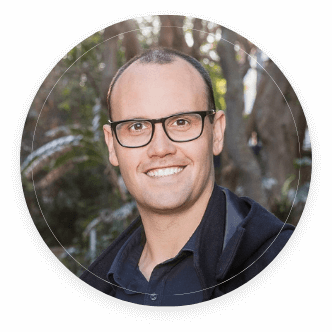
M. Brickwood
![]()
The Freedom Warrior program has given me the education, access to opportunities, and fresh investment advice to setup a bright future for me and my family.

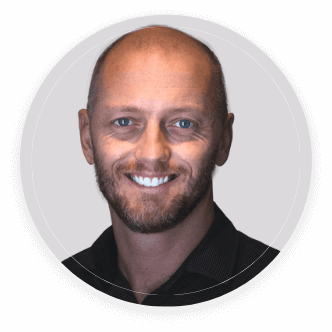
B. Williams
![]()
If you are really serious about building real wealth in your life (intergenerational wealth) and creating a legacy, there is no better place.

